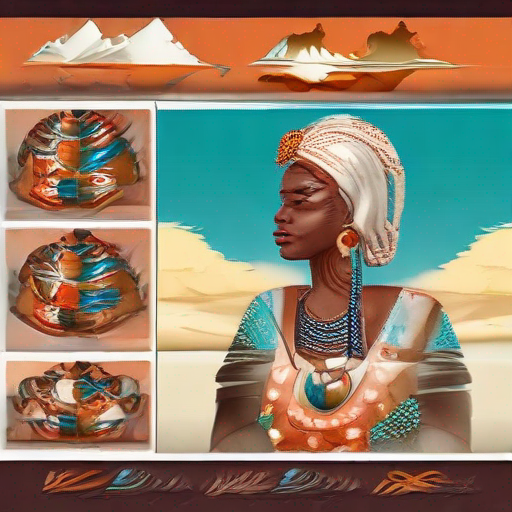
Nigeria Traditional Jewelry Adornments and Significance
Traditional jewelry in Nigeria is a vital part of the country's cultural heritage, with each piece carrying significant meaning and symbolism. From the intricate designs to the vibrant colors, Nigerian traditional jewelry is a treasure trove of beauty and storytelling.
A Brief History of Nigerian Traditional Jewelry
Nigerian traditional jewelry has its roots in the pre-colonial era, when different tribes and kingdoms flourished across the region. Each tribe developed its unique style and symbolism, often tied to their history, mythology, and way of life. As the British colonial era took hold, many traditional practices were suppressed or modified, but the love for traditional jewelry remained.
The Significance of Nigerian Traditional Jewelry
Traditional jewelry in Nigeria is not just a fashion statement; it holds deep cultural significance. Each piece is imbued with meaning, often tied to:
- Rituals and Ceremonies: Jewelry played a crucial role in various rituals and ceremonies, such as weddings, coronations, and initiation rites.
- Status and Rank: The type of jewelry worn signified one's social status, rank, or occupation. For example, only royalty and high-ranking officials could wear certain types of adornments.
- Spiritual Protection: Many pieces were believed to possess spiritual powers, offering protection from evil spirits, bad luck, or harm.
Types of Nigerian Traditional Jewelry
Nigeria is home to an array of traditional jewelry styles, each with its unique characteristics. Some notable examples include:
- Adire: A resist-dyeing technique used to create intricate designs on cloth and beads.
- Beadwork: Intricate bead patterns and designs are a hallmark of Nigerian traditional jewelry.
- Metalwork: The use of metals like copper, bronze, and gold is prevalent in many traditional pieces.
The Revival of Nigeria Traditional Jewelry
In recent years, there has been a resurgence of interest in Nigeria's traditional jewelry. This renewed appreciation can be attributed to:
- Cultural Pride: Nigerians are rediscovering their cultural heritage and the importance of preserving it.
- Tourism and Economic Growth: The demand for traditional jewelry has created economic opportunities and jobs.
The Future of Nigeria Traditional Jewelry
As Nigeria's traditional jewelry continues to evolve, it is essential to strike a balance between preservation and innovation. By combining modern techniques with traditional practices, we can ensure the survival of this cultural treasure while also creating new, unique pieces that will be treasured for generations to come.
Frequently Asked Questions (FAQs)
- Q: What is the most common type of Nigerian traditional jewelry?
A: Adire and beadwork are among the most popular styles. - Q: Can I wear Nigeria traditional jewelry every day?
A: While it's okay to wear some pieces as everyday adornments, others may be reserved for special occasions or ceremonies. - Q: How do I care for my Nigeria traditional jewelry?
A: Handle your pieces with care, avoiding harsh chemicals or excessive exposure to sunlight.
Key Takeaways
- Traditional Nigerian jewelry is a vital part of the country's cultural heritage.
- Each piece carries significant meaning and symbolism tied to history, mythology, and way of life.
- The revival of interest in Nigeria traditional jewelry is driven by cultural pride, tourism, and economic growth.
Table: Types of Nigerian Traditional Jewelry
| Type | Description |
|---|---|
| Adire | Resist-dyeing technique used on cloth and beads |
| Beadwork | Intricate bead patterns and designs |
| Metalwork | Use of metals like copper, bronze, and gold |
Visit the link to learn more about Nigeria traditional jewelry: Nigeria Traditional Jewelry
